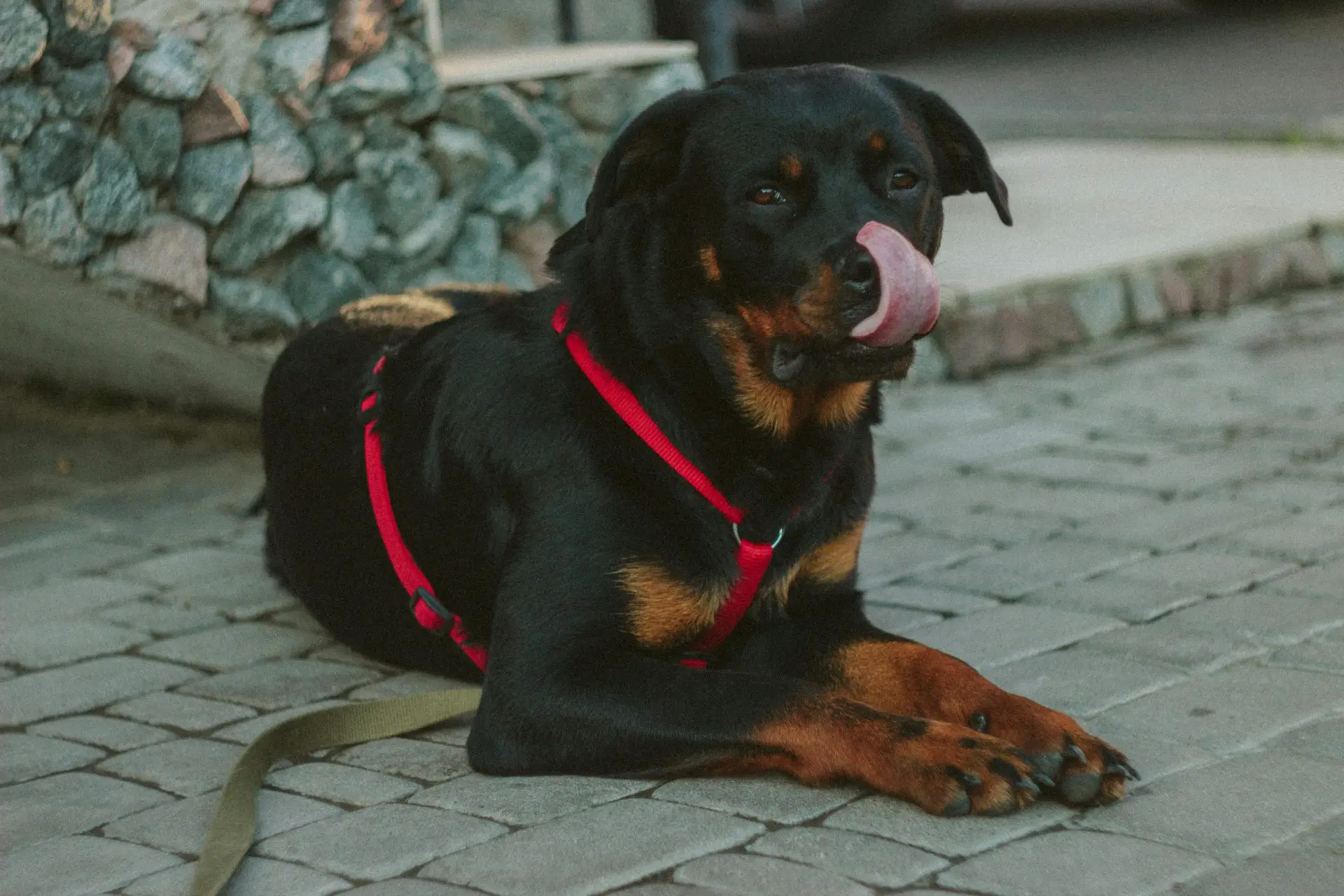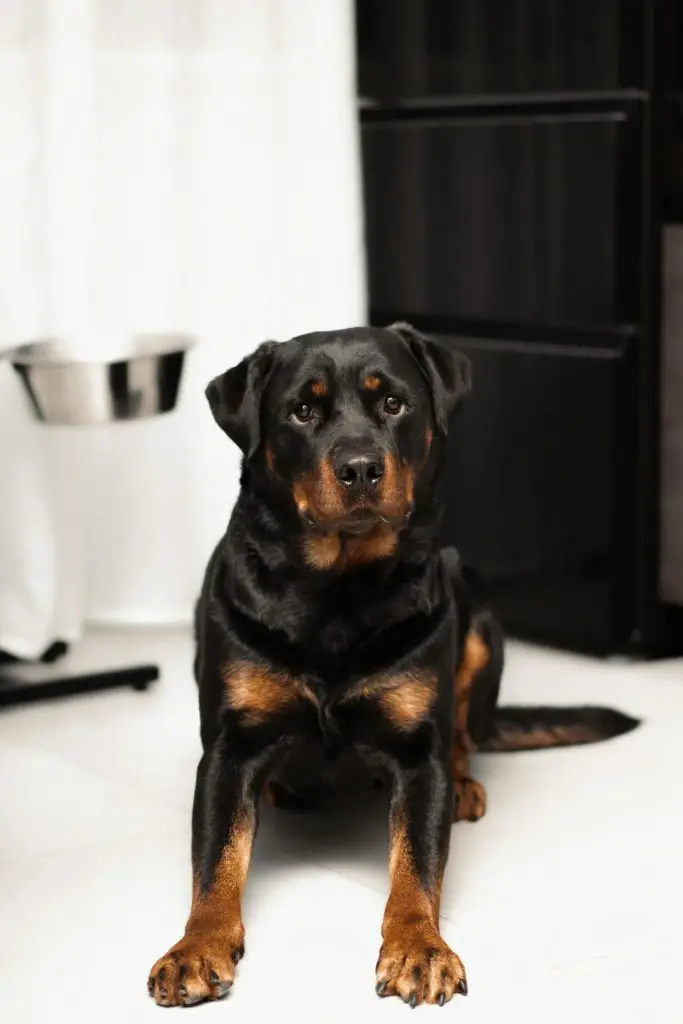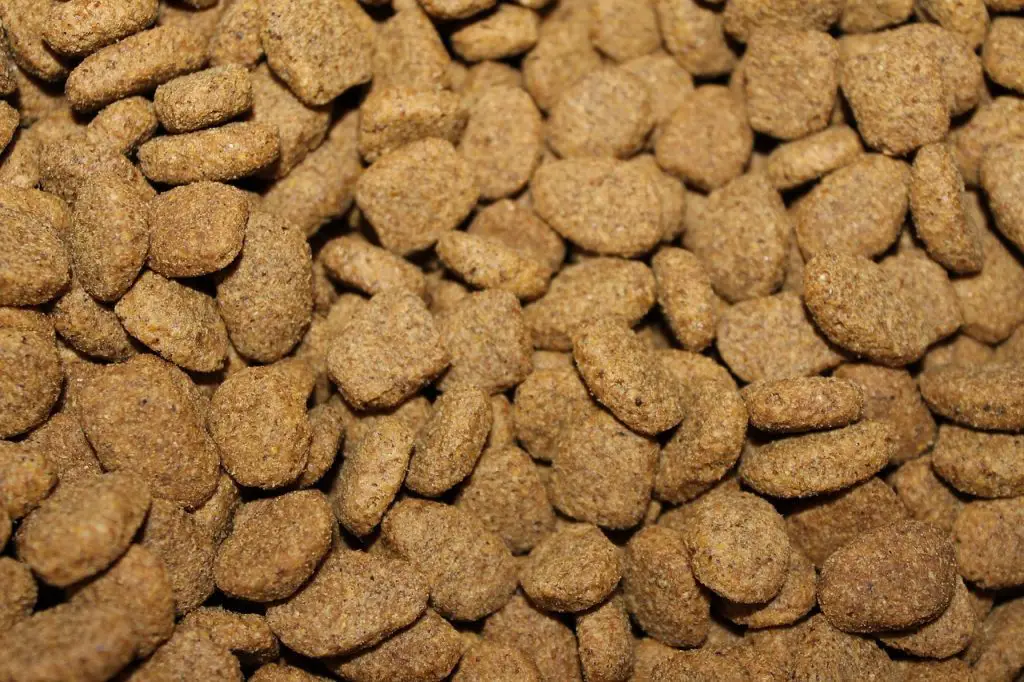The Ultimate Rottweiler Feeding Guide

The Rottweiler is a sturdy and powerful breed, mostly known for its steadfast guardian-like demeanour and loyal character.
This large breed requires the right nutrition to fuel those muscles. And thus, welcome to our ultimate Rottweiler feeding guide.
Want to know the right nutritional needs for your Rottweiler? The right protein, fats, carbohydrates? The essential vitamins and minerals? What about the raw feeding trend? Hydration? Supplements?
There’s just so much to know and think about.
Alas, we aim to provide owners with the right information so that their Rottweilers get all the nourishment they need to grow into healthy, thriving dogs.
Understanding The Nutritional Needs Of Your Rottweiler
Rottweilers require a diet that supports their large size, high energy levels and muscle frame. As repetitive as it sounds, a well balanced diet for a Rottweiler requires protein, fat, carbohydrates, vitamins and minerals.
In short, protein helps develop their muscle growth and maintenance. Healthy fat intake helps keep their skin and coat healthy all whilst helping to develop their brain. And finally, carbohydrates offer additional fuel for their energetic bursts all whilst providing fibre to help their digestive system.
The right access to these macro nutrients also ensures healthy hormonal functioning which helps to keep them healthy and improve their longevity over the long run.
High Quality Protein To Support Muscle Growth
Protein plays a crucial role in Rottweiler diet and nutrition. As a puppy develops through to adulthood, it requires a lot of protein to help support muscle development. Once in its adult years, the Rottweiler also requires a large amount of protein to help support muscle maintenance and repair.
You will be shocked at how fast a Rottweiler grows, and it cannot do this without the right protein intake. You should ensure that a serving of protein is available with every meal, ideally aiming for around 30% of their caloric intake.
As with humans, great sources of protein for your Rottweiler are animal based. This means chicken, beef, lamb and fish are all great sources of protein that come with the necessary amino acid profiles.

These sources of protein are incredibly nutrient dense, which include vitamins, minerals and some fatty acids. To take things a step further, we often recommend adding in some organ meats to help deliver more nutrients. Liver, heart, lung, kidney are all great sources if you can find them.
The Role Of Healthy Fats In The Rottweilers Diet
Talking about the role of fats in diet is always nuanced. We need to differentiate between healthy fats and unhealthy fats.
Healthy fats as you would expect are fats that you would expect to find in natural foods that are untampered with. Salmon for example is full of healthy fats, as is beef.
Unhealthy fats are things that you would expect to find in ultra processed or industrialised foods. This means forms of seed oils, or other fats that are typically made through man-made means.
Fats are calorific, so being mindful of fat sources that go into your dog’s food is advised. That said, fats are essential in supporting healthy skin, coats, brain and hormone function and energy levels. Omega 3’s and 6’s fatty acids are extremely beneficial and can be found in fish, beef and lamb. They can also be found in things such as olive oils, flaxseed oil etc. However, we wouldn’t recommend adding these to your dog’s bowl.
The Role of Carbohydrates & Fibre In A Rottweilers Diet
Rottweilers are a fairly high energy dog that is carrying a lot of power and muscle, therefore carbohydrates are a necessary addition to their diet.
Sources such as vegetables (carrots, broccoli, etc) are good sources of carbs to give your dog. It’s also possible to add things such as potato, lentils, rice to the mix if you’re looking to bulk meals up. However, we would urge owners to moderate their use of starchy carbohydrates as in excess, these can sometimes lead to weight gain.
The precise ratio of protein: fats: carbs is something that owners should look to experiment with. Your protein source is likely to contain some source of healthy fat if you opt for salmon, lamb or beef and should always make up for 30%+ of their caloric intake.
Essential Vitamins & Minerals
Many people can overthink the necessity of vitamins and minerals when it comes to their dog’s diet. Much the same as the human world, the pet supplements industry has exploded.
What’s important to know is that if your base level diet is spot on then most of their vitamin and mineral levels should be taken care of. That said, it’s important to tune into their behaviour, energy levels and appearance at all times, just in case a nutritional need isn’t being met.
Essential vitamins and minerals are vital for immune health, bone health, hormone health and metabolic process.
The most essential vitamins and minerals are:
- Vitamin A – Can be found in: Carrots, spinach, pumpkin, fish oil, sweet potatoes, eggs
- Vitamin B – Can be found in: Liver, beans, green vegetables
- Vitamin C – Can be found in: Some dog suitable fruits, liver
- Vitamin D – Can be found in: Oily fish, eggs, liver, beef and of course sun light
- Vitamin E – Can be found in: Leafy greens, liver
- Vitamin K – Can be found in: Liver, leafy greens and fish
- Calcium – Can be found in: Sardines with bones, raw bones, broccoli, cauliflower, yoghurt
- Phosphorus – Can be found in: Fish, animal tissue
- Magnesium – Can be found in: Spinach, broccoli, seafood, beans
- Potassium, Sodium, Chloride – Can be found in dog friendly fruits, vegetables
- Zinc – Can be found in: Spinach, broccoli, beef, poultry
- Sulphur – Can be found in: Meat, fish, poultry, eggs
- Iron – Can be found in: Red meat, fish, poultry, shellfish, eggs
- Iodine – Can be found in: Kelp, seafood
- Selenium – Can be found in: Seafood, meat, vegetables, rice
- Copper – Can be found in: Seafood, legumes
- Manganese – Can be found in: Leafy vegetables
- Chromium – Can be found in: Lean meat
- Cobalt – Can be found in: Liver, kidney
- Molybdenum – Can be found in: Organ meats, legumes
Yes, this list looks overwhelming. But when you break it down, most vitamins and minerals can be found in a mixture of animal meats, organs, vegetables, legumes and some dog friendly fruits.
Aiming for a mixture of ingredients is the best way to ensure your Rottweiler is getting a good intake of essential nutrients. It’s also a good way of ensuring that their food remains interesting.
Hydration
Last but not least is hydration. An area that is often overlooked when it comes to nutrition.
Yes, you want to ensure the common sense basics. Your Rottweiler should have access to fresh, clean drinking water at all times. Sometimes it pays to place multiple bowls around the house, especially in the hotter months.
But what about taking their hydration a step further? Hydrogen water is a new trend breaking the fitness world, which is also safe for dogs. It acts as a potent antioxidant that can also help to repair damaged cells and promote faster healing as found in this 2021 study.
Feeding Schedule & Portions
Rottweilers will benefit from a consistent feeding schedule. How much and how often you feed them depends on where they’re at in their development where age, weight and energy levels are all important considerations.
How much should you feed your Rottweiler Puppy?
Rottie’s grow at an exceptional rate. Your puppy, depending on their age, should likely be fed several times a day. Little and often is the way to go. You gradually want to wean them onto larger meals, less frequently.
It should also be noted that high nutrition grade kibble has its place when it comes to feeding a puppy as their teeth development will benefit from it.
How much should you feed your fully grown rottweiler?
The typical feeding schedule for an adult Rottweiler is a moderate amount, twice a day. Dividing their feeding into two helps combat issues such as gastrointestinal bloat, which is more common in deep chested molosser & mastiff type dogs.
Additionally, you want to keep a constant eye on their weight levels, muscle maintenance and overall energy levels. Natural ingredients are best, so stay away from foods that are high in additives, preservatives and other ingredients that a 7 year old would struggle to pronounce. A healthy, clean diet can work wonders for your Rottweiler’s overall lifespan and longevity.
Choosing The Right Type Of Food For Your Rottweiler
Thankfully, the dog food industry has moved on a lot in recent years. Gone are the days of bland, nutritionless kibble and jellied meats (although they still exist to some degree).
These days we’re spoiled for choice. Premium grade kibble, wet food in a hundred different flavour combinations, fresh food subscription boxes, and what about raw feeding that is being adopted by many dog owners across the globe.
The best food for your Rottweiler can depend on many factors. This can range from foods that they just simply seem to enjoy more, to foods that are dictated by your budget.
In an ideal world, we would always advocate for foods that offer large nutritional value, remove all nasties and are cost effective.
Kibble vs Wet
Many owners simply go for a combination of both kibble & wet food, this has been the way for years.
Kibble offers some great dental benefits, especially for puppies whose teeth are still developing. However it’s drawbacks are that it’s often heavy in inflammatory ingredients such as wheat, cereals, seed oils, additives and preservatives. The impacts of which are poorer skin and coat condition, bloating and insulin spikes.

Wet food on the other hand offers a lot more flavour and can be hydrating. And although you can now find good clean wet food options, these are often presented at a higher price. On top of that, you still need to read the ingredients labels. Many wet foods are full of preservatives, additives and seed oils.
All in all, it’s certainly possible to get clean versions of kibble & wet food that have a good nutritional profile, however this comes at a premium.
Raw Feeding A rottweiler
Raw feeding has grown in popularity over the last 5 or so years. Many enthusiasts say this is the best way to feed your Rottweiler. It’s basically a natural, wholefood diet that can help ward off a lot of health conditions such as obesity, joint issues, dental and digestive issues.
Experts in this way of feeding say that the dog’s stomach is not anatomically designed to digest and ferment carbohydrates (the main ingredient in kibble). And over feeding them starchy foods can inflame their digestive system and cause them a lot of stress.
Raw feeding your Rottweiler requires the following:
1
A source of healthy protein
Chicken, Turkey, Beef, Lamb, Fish, Game
2
Essential fatty acids
Fish, Meat, Game, Bone Marrow
3
Minimal carbohydrate
Leafy greens, limited dog friendly fruits & berries
4
Natural vitamins & minerals
From bones and some plant sources
Is raw feeding your Rottweiler expensive?
It certainly can be. There are many subscription websites out there that will charge a fortune for raw dog food. So ultimately, you have some thinking and budgeting to do.
These websites provide a good trade off in the sense that the meals should be well balanced, sourced from high quality ingredients and ultimately convenient for you if you live a busy lifestyle.
However, it’s certainly possible to do raw feeding on a budget. Shop around, get to know your local butcher or farmer. Go for cheap cuts of meat, food that is reduced and can be frozen, bulk buying. There are many ways to optimise this.
Supplements
Your dog’s food should include many of the essential macro and micro nutrients needed to help them thrive. However, you can always go the extra mile if you feel the need is there.
Rottweilers can suffer with some joint issues, this means that supplements such as glucosamine can help. Additionally, ensuring they have enough omega 3’s in their diet can help improve their skin and coat health along with aiding brain and heart health. Lastly, some owners like to use pre and probiotics at feeding times to help with digestion and overall gut health.
Treats
Treats have their place, that’s for sure. Although many treats aren’t the healthiest, they’re especially good for training and obedience.
Our recommendation here would be to try to find healthy treats that are low in additives and preservatives. They do exist, but again, they likely cost more. Alternatively, you can make some healthy treats at home.
Two good examples are:
1
Crispy Chicken Skin
Find yourself cooking chicken for dinner? Remove some of the skin and put it in an air fryer at high heat to crisp it up. This can last for a couple of days in the fridge and serve as a delicious treat or snack.
2
Beef Jerky
Get some cheap cuts of beef (flank, skirt, top, round), cut into thin slices and then dehydrate them and turn them into jerky.
Bone Appétit: a Tasty Recap Of The Rottweiler Feeding Guide
In summary, you want to get familiar with the nutritional needs of your Rottweiler. This means the macro (protein, fats, carbs) and the micro, which is the list of essential vitamins and minerals.
We would always advocate for natural foods as much as possible. These remove harmful ingredients, preservatives and additives. They are more gut friendly to your dog which can help improve their longevity, keep health issues away and improve their overall day to day wellbeing.
When it comes to the type of food you feed your Rottweiler, the decision ultimately depends on your level of investment, access to good quality foods and lifestyle. Things like kibble can be convenient, but they can come with a host of downsides if you don’t pay close attention to the ingredients.
excellent submit, very informative. I’m wondering why the opposite experts of this sector do not realize this.
You should continue your writing. I’m confident, you’ve
a huge readers’ base already!